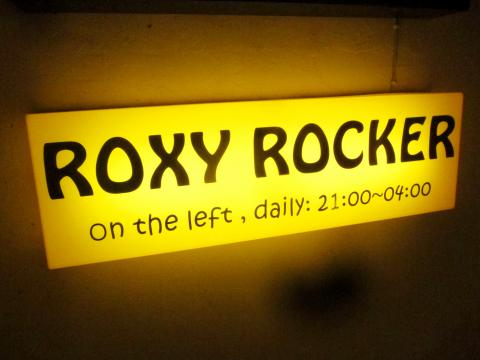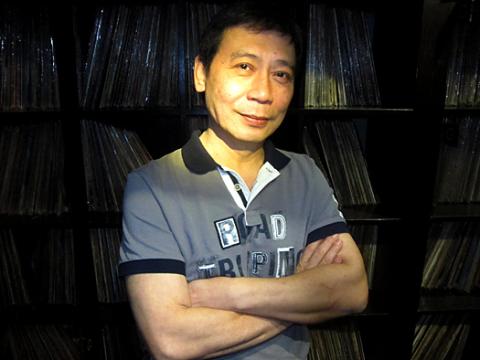The Roxy chain of bars and clubs has been a mainstay for rock and roll and an expat hangout in Taipei for more than three decades. Now it is slowly being pressured out of its longtime stronghold in the Shida neighborhood by the city government. Roxy 99, a late night pub operating for 15 years, will move to a new location on Fuxing South Road in August as the result of a string of noise complaints. Roxy Rocker, a bar with a stage for live music, has cancelled all performances by foreign nationals after inspections by Taipei City’s Department of Labor in early May.
Roxy’s owner Ling Wei (凌威), who has been running bars for more than three decades, finds the situation unprecedented. He opened his first bar, a music pub called AC/DC Rock House near National Taiwan University in 1982 and four years later opened a second pub called Roxy. He has been running bars, clubs and live music venues ever since, housing his collection of more than 10,000 vinyl records in a special listening lounge in one of the newer venues, Roxy Rocker. His clientele has always been a mix of locals and expats. Yet in all his years of doing business, Ling has never witnessed the kind of government scrutiny he is experiencing now.
Last August, repeated fines caused Ling to close Jr. Cafe, a 24-hour bar and restaurant in the heart of the Shida student district. The bar had operated without complaints for 18 years before it was targeted last year by the Shidahood Self-help Association (師大三里里民自救會), an advocacy group of residents that opposed a variety of businesses, specifically those selling alcohol. The Association hung banners above Jr. Cafe and other nearby businesses accusing them of noise and air pollution. Ling countered with a banner of his own, calling the association a group of “fake neighbors.”

Photo: David Frazier
“I had been there all those years and never had one complaint from my upstairs neighbors. The Self-help Association claimed to represent my neighbors, but that was completely fake. My neighbors and I got along very well,” said Ling.
Ling says the trouble at Roxy 99 started after Jr. Cafe closed.
“I don’t know who the complaints are coming from,” said Ling. “Roxy 99 is on a six-lane road and in a commercial building with no residential tenants. It has been there for 15 years. Who are we bothering?”

Photo: David Frazier
Shidahood is a well-organized lobbying group that has targeted businesses by generating huge volumes of complaints relating to noise, kitchen exhaust, signs that stick too far out into roadways, illegally subdivided lots and various other violations. Some businesses have received multiple complaints on a daily basis for months. From the beginning of this year, Taipei City has also lowered the threshold for noise violations.
When I asked Ling if he thought the Shidahood Association had targeted Roxy 99, he replied, “We cannot say. But I am tired of fighting it. We have to move. That is for sure.”
Roxy Rocker first experienced trouble from May 3, when two officials from the Taipei City Department of Labor appeared to check the performance permit of a band with one foreign member.
Though the law is seldom enforced, all foreigners performing music in Taiwan need special work permits. The permits require proof of professional activities — such as CDs, fliers or media coverage — from outside of Taiwan, so they are not easy to get for expats who only live and play locally.
Ling calls the law “a dinosaur” and believes his current trouble to be an “isolated incident.”
“As far as I know, no other performance venues have had any problems,” he said.
However, Ling believes the implications could be severe. “These were not professional performers. This was an amateur, unpaid performance, but they are treating it as a professional performance, like a performance in Taipei Arena,” he says. “Amateur performance is the most basic level of the music scene. If you close the door on foreigners performing there, how are you going to say you have a vibrant cultural environment?”
Roxy currently operates Roxy 99, Roxy Rocker and Roxy Mini. Beyond the impending move by Roxy 99, by late summer Ling plans to open a jazz-themed bar and a new live house with a capacity of 300-400.
Music on campus
Campus rock festivals can be fun, especially when they are free, open to the general public, and have a decent lineup, as does an event curiously titled, “Is My Future a Dream?” to be held this Sunday at National Chengchi University in Muzha. The question posed by the event title seems open ended enough, but then we discover that the organizers are a group of college students from several local universities called the Desolation Club (荒漠俱樂部). They no doubt imagine a future of 12-hour work days in a fluorescent lit office making NT$25,000 a month, if they are lucky enough to find a job. For the moment, at least, they still have rock and roll. At the concert, there will be three stages with 18 bands, some of them quite notable. Sissy Chao (趙一豪), a legendary first wave Taiwanese rocker from the ’80s and ’90s who modeled his sound on Jim Morrison, will play alongside a slew of bands from the current generation, most of them playing various strains of postrock, post punk or indie pop. To get there, take the MRT to Muzha Station and then a bus, or else hoof it for the final kilometer.
Is My Future a Dream? music festival features Elephant Gym, Bowz Tiger, Insecteens, Frande, Sissy Chao & Double X, Orange Grass, Silent Toads, My Skin Against Your Skin, EggPlantEgg and others. It starts at noon on Sunday June 2 at National Chengchi University (國立政治大學), 64 Zhinan Rd, Sec 2, Taipei City (台北市文山區指南路二段64號). Admission is free.

This year will go down in the history books. Taiwan faces enormous turmoil and uncertainty in the coming months. Which political parties are in a good position to handle big changes? All of the main parties are beset with challenges. Taking stock, this column examined the Taiwan People’s Party (TPP) (“Huang Kuo-chang’s choking the life out of the TPP,” May 28, page 12), the Democratic Progressive Party (DPP) (“Challenges amid choppy waters for the DPP,” June 14, page 12) and the Chinese Nationalist Party (KMT) (“KMT struggles to seize opportunities as ‘interesting times’ loom,” June 20, page 11). Times like these can

June 23 to June 29 After capturing the walled city of Hsinchu on June 22, 1895, the Japanese hoped to quickly push south and seize control of Taiwan’s entire west coast — but their advance was stalled for more than a month. Not only did local Hakka fighters continue to cause them headaches, resistance forces even attempted to retake the city three times. “We had planned to occupy Anping (Tainan) and Takao (Kaohsiung) as soon as possible, but ever since we took Hsinchu, nearby bandits proclaiming to be ‘righteous people’ (義民) have been destroying train tracks and electrical cables, and gathering in villages

Dr. Y. Tony Yang, Associate Dean of Health Policy and Population Science at George Washington University, argued last week in a piece for the Taipei Times about former president Ma Ying-jeou (馬英九) leading a student delegation to the People’s Republic of China (PRC) that, “The real question is not whether Ma’s visit helps or hurts Taiwan — it is why Taiwan lacks a sophisticated, multi-track approach to one of the most complex geopolitical relationships in the world” (“Ma’s Visit, DPP’s Blind Spot,” June 18, page 8). Yang contends that the Democratic Progressive Party (DPP) has a blind spot: “By treating any

Swooping low over the banks of a Nile River tributary, an aid flight run by retired American military officers released a stream of food-stuffed sacks over a town emptied by fighting in South Sudan, a country wracked by conflict. Last week’s air drop was the latest in a controversial development — private contracting firms led by former US intelligence officers and military veterans delivering aid to some of the world’s deadliest conflict zones, in operations organized with governments that are combatants in the conflicts. The moves are roiling the global aid community, which warns of a more militarized, politicized and profit-seeking trend